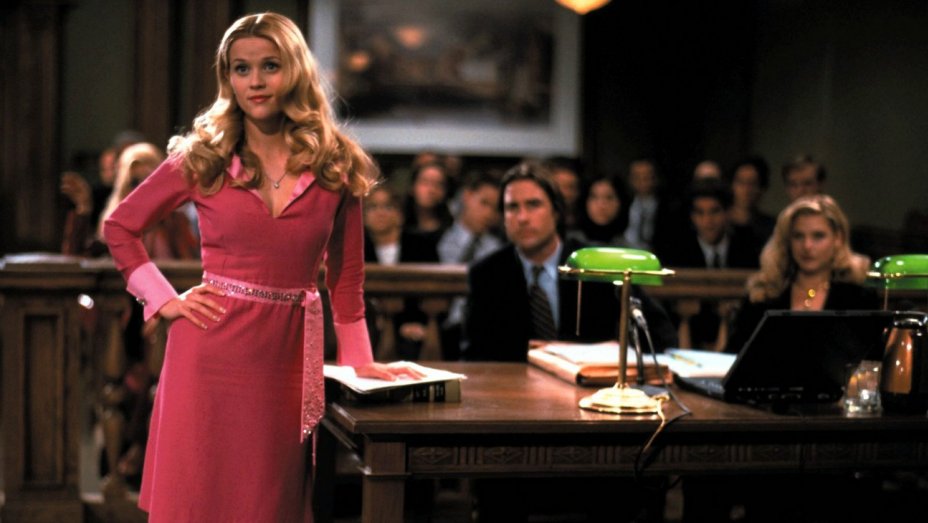Legally Blonde Tramples Over Almost All Romantic Comedy Tropes... In Heels, No Less
The center of Legally Blonde’s plot comes from the way it handles Elle’s desire to go to law school. Yes, like many female characters her in film, her ambition is initiated by her desire to win over a man. Still, she does not need his or anyone’s help to achieve her dream of going to Harvard and being a successful lawyer. She studies as hard as she can and only misses a perfect score on her LSATs by one point (Cormier, 2016). This is but one of the ways in which the film goes against the “dumb blonde” stereotype, which is its intention. Elle never intentionally harms others, though she can sometimes be catty when offended.
By proving herself without changing and using her knowledge of hair and fashion to her advantage, she shows that a woman does not have to alter herself to be something great and that they can do typically “male-oriented” jobs like being a lawyer. It recognizes that because of her looks, there will be people who look down on her as “just a piece of ass,” wanting her for her body like the devious Professor Callahan. However, it also shows that these setbacks can be overcome with determination. This is something that few movies, especially romantic comedies, have ever touched on.
Love triangles, in which two women or men vie for one object of their affections, are incredibly common in films and especially prevalent in romantic comedies. The first and third Bridget Jones movies have Mark Darcy fighting against another man for Bridget’s affections. My Best Friend’s Wedding (Hogan, 1997) centers entirely on a woman attempting to sabotage her best friend’s wedding because she has fallen for him. Legally Blonde uses this trope but takes it in an interesting direction. Vivian and Elle begin as enemies when fighting over Warner, but after time passes and they learn to understand each other, they become friends in the end. Also, in a shocking twist, the scummy object of their affections ends up with neither girl!
Despite its subversive nature, there are still romantic comedy tropes in Legally Blonde. The heroine still gets a man but, fortunately, falls in love with someone who understands her and appreciates her for everything she is. Elle is bubbly and lovable as well as beautiful and smart; she toes the line of Manic Pixie Dream Girl with her Prada shoes. There is also a “where are they now” monologue” that test audiences desperately wanted to see (Cormier, 2016). However, none of these tropes subtract significantly from the film as a whole, as viewers expect them from a romantic comedy.
What does subtract somewhat from Legally Blonde is the arguably stereotypical representations of certain characters. Gay characters of all kinds are portrayed in a homophobic and/or campy manner. Why can only a gay Latino male recognize Prada shoes (Theroguefeminist, 2015)? Not only that, but discovering his sexual preference becomes an essential detail in the final case (it is also the subject of a hilarious but definitely stereotypical song from the Legally Blonde musical, shown below).
It is interesting that Legally Blonde would simultaneously speak to and work against tropes in its genre and in film more generally. Things like negative stereotyping feel almost out of place when almost everything else is so subversive and trope-shattering. It also shows how deeply ingrained these viewpoints are and how many films rely on them.
The romantic comedy genre benefits from films like Legally Blonde to give it a breath of fresh air, provide something new, and point out possibly problematic norms. While it does use previously established concepts and engages in some problematic stereotyping, it still provides a more positive and varied story for viewers. Elle is a role model, and her struggles are so common that it is curious they have not been addressed more often.
Works Cited
- Cormier, Roger. "15 Snappy Facts About Legally Blonde." Mental Floss. Mental_floss, 13 July 2016. Web. 20 Apr. 2017.
- Fagan, Chelsea. "5 Romantic Comedy Tropes That Need To Die." Thought Catalog. Thought Catalog, n.d. Web. 20 Apr. 2017.
- Legally Blonde. Dir. Robert Luketic. MGM Home Entertainment, 2001.
- "Legally Blonde (2001)." IMDb. IMDb.com, n.d. Web. 20 Apr. 2017.
- Silvia Appolonio. “Legally Blonde the Musical Gay or European.” YouTube. YouTube, 8 Oct 2010. 20 April 2017.
- Theroguefeminist. "Legally Blonde - Feminist Review and Analysis." The Rogue Feminist. The Rogue Feminist., 11 Mar. 2015. Web. 20 Apr. 2017.
- "Welcome to TV Tropes." TV Tropes. TV Tropes., n.d. Web. 20 Apr. 2017.


 RSS Feed
RSS Feed
